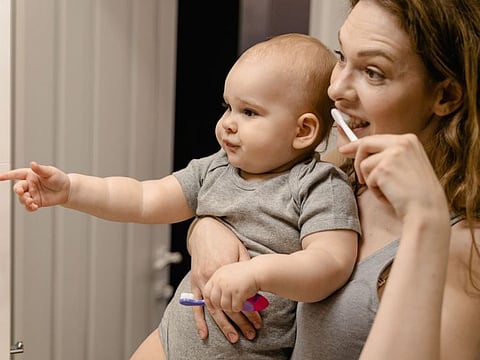'It might come as a surprise to many, but dental cavities are contagious'
Dentists warn that cavities can certainly spread from person to person, mum to baby

Highlights
- Dental cavities are contagious — and can certainty spread from person to person.
- Cavities can also spread the way you catch a cold.
- Find the ways to avoid its spread.
Dubai: The tooth is one of the hardest parts of the human body. But sugars can eat it away. How? Through tooth cavities — which may be considered contagious, especially to young children and babies.
No, this is not a TikTok thing. This is what dentists warn.
Here’s the freaky part: Our toothbrushes can still hold disease-causing bacteria even if we wash them several times a day. When toothbrush heads are placed close to each other, you are already transferring the bacteria and germs indirectly to your loved ones, dentists say.
Cavities: Holes in the teeth
“Cavities are the small holes that occur as a result of sugar build up in our mouths, which causes damage to the teeth,” explained Dr Farzana Hameed Salhi, GP Dentist, Aster Beauty Clinic, Al Warqa.
The Dubai-based dentist said that while these holes can’t spread to other teeth, the bacteria that causes cavities can definitely spread.
How do sugars ruin your teeth?
“Streptococcus mutants and Streptococcus Sobrinus are the bacteria behind tooth decay,” Dr Salhi added. “If there is a decay causing bacteria in one tooth, it is possible it could also settle in adjacent teeth if the conditions are right.”
These bacteria feed on sugars in the mouth. This then creates an acid — which eats away tooth enamel.
If you are not careful, this bacteria can spread from one person to another, as with any other contagious ailment.
Dental cavities
Dental cavities, also called dental caries, is an infectious micro-biological disease of the teeth that results in destruction of calcified tissues, said Dr Sumaira Rashid Mir, GP Dentist, Aster Clinic, Discovery Gardens, Dubai. "It might come as a surprise to many but dental cavities are contagious," the Dubai-based dentist said. "Parents might not know but they can be unconsciously spreading bacteria to their children by kissing them or using the same utensils. Cavities are caused by bacteria hence can be spread through saliva or through close contact with another person who has poor oral hygiene."
TIP: Toothbrushes should be stored apart
Most dental professionals advise that toothbrushes should be stored apart, placed upright, and without cover to let them dry.
And how do cavity-causing bacteria spread from person to person?
Dr Salhi explained it can spread via the following:
Cavities are the result of tooth decay due to the acids released by the disease-causing bacteria. Once acids break down the enamel in the tooth.
The next target: the dentin, where blood vessels are found. Bacteria only need sugar and acids for larger cavities to form and destroy the tooth structure.
Dental cavities are contagious — and can certainty spread from person to person. Cavities can also spread the way you catch a cold.
How and when do cavities spread?
Cavities spread through saliva. The cavity-causing bacteria can be transferred to another person during an exchange of saliva. That means you can acquire a cavity through the following situations:
When a tooth starts aching, what is it a sign of?
Generally, pain is caused when nerve in the root of a tooth or surrounding a tooth is irritated, dental infection, decay, injury or loss of a tooth are the main causes of pain.
It clearly gives you a green signal to make an appointment with your dentist — and get it checked and treated.
Sign up for the Daily Briefing
Get the latest news and updates straight to your inbox



